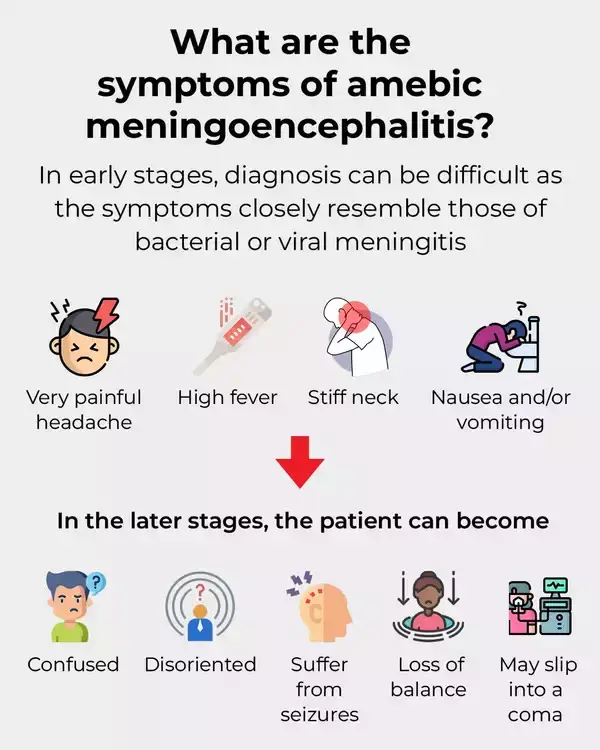Amebic meningoencephalitis is a rare but severe infection that affects the brain and its surrounding tissues. Caused by free-living ameba’s, this condition often presents symptoms similar to bacterial or viral meningitis, making early diagnosis challenging. Here’s a closer look at the symptoms and progression of understanding amebic meningoencephalitis.

Early Symptoms
In the initial stages, the symptoms of amebic meningoencephalitis closely resemble those of other forms of meningitis, making it difficult to distinguish:
Very Painful Headache:
One of the most prominent early symptoms is a severe headache that can be debilitating.
High Fever:
A significant rise in body temperature is common, indicating the body’s response to infection.
Stiff Neck:
Patients often experience a stiff neck, a hallmark symptom of meningitis.
Nausea and/or Vomiting:
Gastrointestinal symptoms such as nausea and vomiting frequently accompany the infection.
Later Symptoms
As the disease progresses, the symptoms become more severe and specific, reflecting the extensive
impact on the brain:
Confusion:
Patients may become increasingly confused, unable to think clearly or process information.
Disorientation:
Alongside confusion, there can be a loss of awareness regarding time, place, and identity.
Seizures:
The infection can trigger seizures, which are sudden, uncontrolled electrical disturbances in the brain.
Loss of Balance:
Patients may struggle with coordination and balance, increasing the risk of falls and injuries.
Coma:
In severe cases, the infection can lead to a coma, a state of prolonged unconsciousness.
Challenges in Diagnosis
Diagnosing amebic meningoencephalitis in its early stages is particularly challenging due to its symptom overlap with bacterial or viral meningitis. Healthcare providers need to consider the patient’s history, including recent freshwater exposure, as certain ameba’s thrive in such environments. Advanced diagnostic techniques, including cerebrospinal fluid analysis and also brain imaging, are often required to confirm the presence of the ameba.
Conclusion
Amebic meningoencephalitis is a life-threatening condition that demands prompt recognition and treatment. Awareness of its symptoms, especially the severe headaches, high fever, stiff neck, and gastrointestinal issues in the early stages, can aid in faster diagnosis. As the disease progresses, the onset of confusion, disorientation, seizures, and balance loss signals critical brain involvement. Understanding these symptoms can help in distinguishing this rare infection from more common forms of meningitis, ultimately improving patient outcomes.
Designed by : timesofindia










![13 Personality Types In Every Office [InfoGraphic]](https://samplevisualization.com/wp-content/uploads/2013/10/13-Personality-Types-In-Every-Office-InfoGraphic-feature-image-300x225.webp)